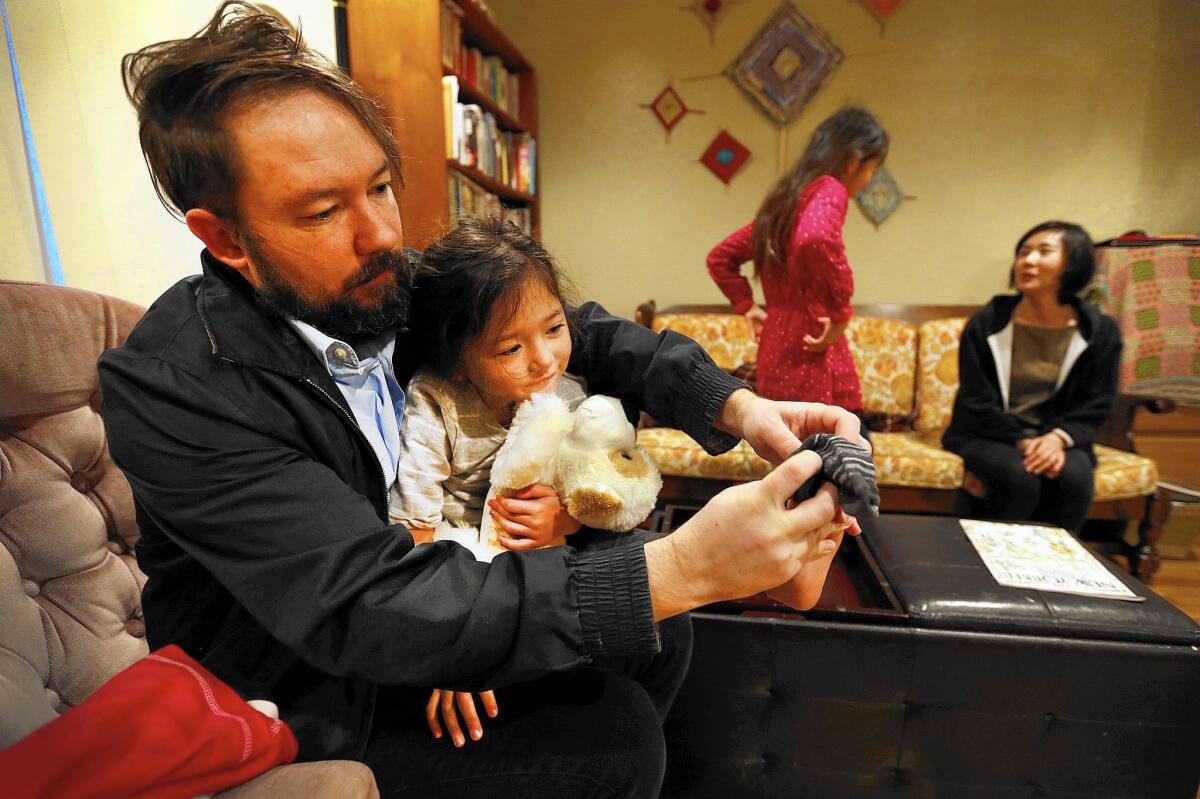As USC faculty awaits results of a union vote, some hope for âa bigger voiceâ

Nate Heneghan, helping his 4-year-old daughter Ada with her socks, is one of about 430 non-tenure-track faculty members at USC awaiting results of a vote on whether to be represented by SEIU Local 721.
Nate Heneghan was optimistic about his fledgling academic career when he joined USCâs teaching ranks last fall as a lecturer in the department of East Asian Languages and Cultures. But after just one semester in the job, disillusionment had set in.
His paychecks werenât arriving on time. The university eliminated his vision insurance benefits. To make ends meet, he took on a crushing teaching load. That meant putting his research on the back burner â along with any hope of landing a tenure-track faculty position that would bring a measure of job security and higher pay.
The way out of this dead-end spiral, he hopes, is to unionize.
Heneghan is one of about 430 non-tenure-track faculty members who will decide whether to be represented by the Service Employees International Union Local 721. Ballots have been cast, and results will be announced Tuesday.
âI feel like a union would give us a bigger voice,â Heneghan said.
Concerns about low pay, large workloads and a lack of job security have prompted non-tenure-track employees at private colleges and universities around the nation to consider unionizing to improve their working conditions. Adjunct faculty at Georgetown University unionized in 2013, and Tufts University full-time faculty organized last February.
If union supporters such as Heneghan win a majority of votes, USC will become one of the largest private universities to have organized faculty.
The organizing effort at USC is âa clear signâ that the trend âis continuing to grow nationwide, not slowing down,â said William A. Herbert, the executive director of the National Center for the Study of Collective Bargaining in Higher Education and the Professions at Hunter College in New York.
Faculty unions are common at public universities, including the Cal State and UC systems. Thatâs because, in part, unions are able to wield political pressure to ensure they have a role on campus, experts said.
The service employees union has been trying to get a foot in the door at USC for about a year. Its focus is on non-tenure-track faculty members, especially lecturers such as Heneghan, in the Dornsife College of Letters, Arts and Sciences, the Roski School of Art and Design, and the USC International Academy. Lecturers are generally responsible for leading discussion groups and teaching some classes, in addition to grading papers. Unlike their counterparts on the tenure track, they are not evaluated on the basis of their research.
Lecturers are paid about $30,000 annually if they teach a full-time course load of six courses, union officials say, athough USC officials say the number is much higher. A survey by the Chronicle of Higher Education found that lecturers earn nearly $70,000, and that professors on the tenure track earn an annual salary of $90,000 to $102,000. And while USC has to build a case against a professor it wants to fire, non-tenure-track faculty members can be let go before the end of their contracts if they get a warning 90 days in advance.
In the current academic year, USC has 1,472 tenured and tenure-track faculty members and 4,265 non-tenure-track faculty, according to the university.
If the drive is successful, all non-tenure-track faculty in Dornsife, Roski and the International Academy will have to join the union and, if a contract is ratified, pay dues totaling 1.5% of their pay.
See more of our top stories on Facebook >>
Union officials say lecturers such as Heneghan could have higher pay and more security if they are organized. At Whittier College, non-tenure-track faculty members negotiated a pay raise and a professional development fund in their first SEIU contract last year.
Nancy Lupo, a part-time lecturer at the Roski School, said those are some of the reasons sheâs interested in joining a union.
âItâs just really stressful not knowing what the future holds,â said Lupo, who lost her health insurance this semester when one of her classes was canceled at the last minute.
Kate Levin, a part-time instructor in the writing program, added that unionization could lead to a better educational experience for students.
âIf you can spend your time concentrating on class instead of worrying about job security, it should make you a better professor,â she said.
USC administrators said a union wouldnât necessarily lead to higher salaries but could create a more adversarial relationship with faculty. Michael Quick, who became USCâs provost in April, has sent several letters to faculty asking for time to address their concerns.
âI understand the anger and frustration that some of our faculty members feel. Those feelings are legitimate,â he said in a Jan. 8 email. âWhat I am asking is simply that, as your new provost, you give me a chance.â
Some non-tenure-track professors arenât quite on board with the prospect of a union.
One of them is Ginger Clark, who teaches counseling courses in the USC Rossier School of Education and serves as president of the Academic Senate. She sent a letter to her colleagues in December saying that USC has made progress on issues such as salary and merit pay, and things are set to improve further as the faculty continues to work with the administration.
Clark did not respond to requests for comment.
Heneghan, who earned his doctorate from USC last year with a dissertation on film and literature made by ethnic Koreans living in Japan, applied for nearly a dozen tenure-track positions in cities from Chicago to Irvine. When no offers materialized, he agreed to stay at USC as a lecturer.
âI was grateful and I thought it was better than nothing,â he said.
But Heneghan quickly found that the workload was overwhelming, especially this semester. On Mondays, for instance, he spends six hours in a row either teaching classes or attending related lectures. He admits itâs hard for him to concentrate by the afternoon.
âSo much of teaching is energy, and I just donât have it,â he said.
Heâs also irked by USCâs failure to deliver paychecks on time and said he still hasnât seen his added workload reflected in his check.
âWeâre kind of an afterthought and not a priority,â he said. âGreater representation for us would make a difference.â
Lupo, a sculptor, also said union representation could help preserve benefits such as health insurance. Losing her health plan this semester was especially worrisome because her husband has been receiving treatment for pre-cancerous moles.
âIâve always supported the union in theory but now itâs this incredibly personal thing,â she said.
Twitter: @byjsong
ALSO
Department of Justice to investigate San Francisco Police Department
O.C. Sheriffâs Department examines what went wrong as fugitives return to jail
Winds topping 115 mph hit Southern California; 1 killed when tree falls on car
More to Read
Sign up for Essential California
The most important California stories and recommendations in your inbox every morning.
You may occasionally receive promotional content from the Los Angeles Times.











